Experiencing hair loss can be distressing, and many people turn to natural solutions for relief. In this discussion, we delve into the effectiveness of flaxseeds for hair care. But is flaxseed good for hair?
This article, presented by Sure Life Health, aims to explore the benefits and practical tips for using flaxseed to nourish your locks.
Is Flaxseed Good For Hair?
The effectiveness of flaxseed for hair care is backed by a growing body of scientific research. Flaxseed is rich in essential fatty acids, vitamins, and fibers.
The presence of these nutrients helps to strengthen hair, improve elasticity, and even promote hair growth by nourishing the follicles and scalp.
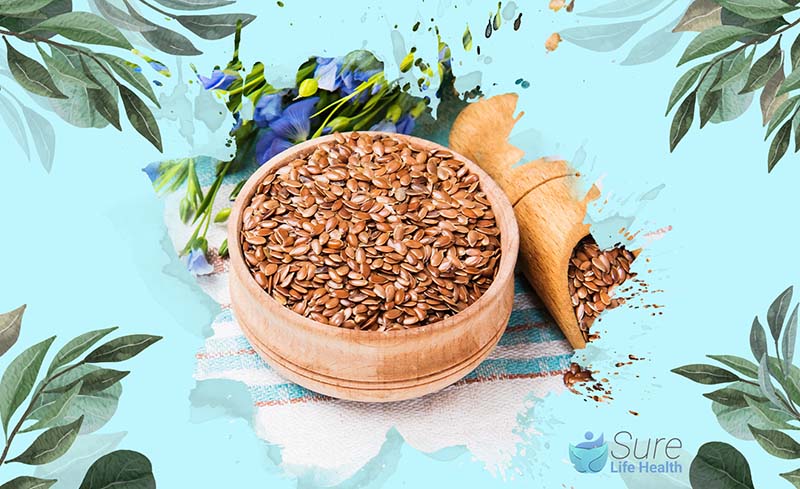
Comparison: Flaxseed Gel Versus Flaxseed Oil
The benefits of flaxseed for hair may leave wonder, “Is Flaxseed Oil good for hair?” or “Is Flaxseed Gel good for hair?”, while coming across these two different solutions. Here are some tips to help you understand.
Flaxseed Gel and Flaxseed Oil both offer significant benefits for hair health, but they serve different purposes due to their distinct properties.
Flaxseed Gel
Flaxseed Gel, being water-based, provides excellent moisture to the hair. It excels as a versatile hair styling product, especially for natural hair.
It helps define curls, enhances twist-outs, supports loc retwists, and is ideal for achieving sleek ponytails and buns. If your goal is to add nutrients, maintain moisture, and improve your hairstyle, Flaxseed Gel is the preferred choice.
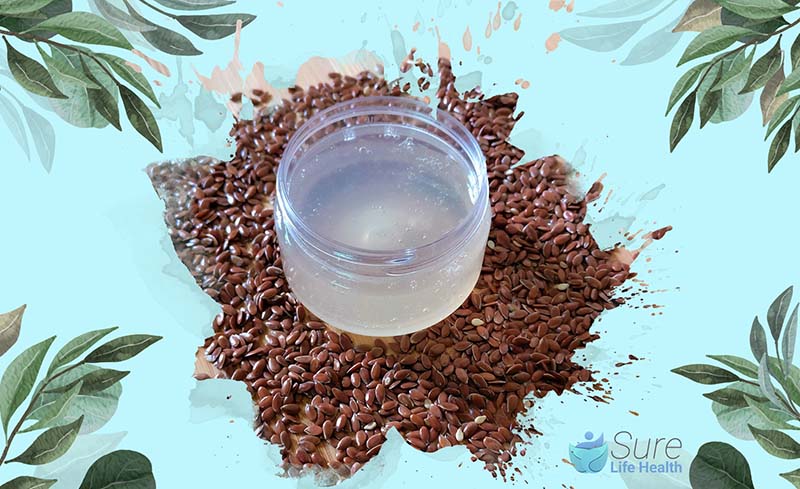
Flaxseed Oil
On the other hand, Flaxseed Oil is celebrated for its ability to add a luminous shine to hair and reduce frizz. Like the gel, it carries similar health benefits for the hair.
However, unlike the gel, the oil is not inherently moisturizing and does not function well as a styling agent. Flaxseed Oil is perfect if your priority is to nourish your hair, enhance its shine, and minimize frizz.
Both products have their unique advantages, so choosing between them depends on your specific hair care needs and styling preferences.
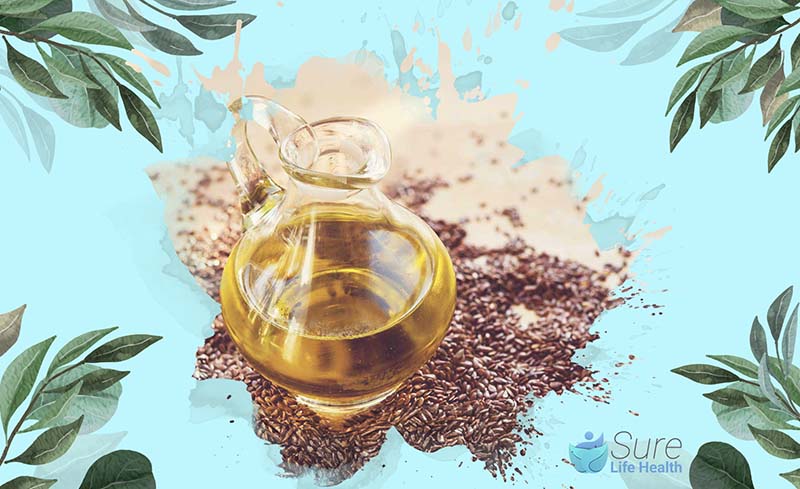
11 Uses Of Flaxseed For Hair Growth
Here are 11 benefits of flaxseed for hair that you may want to know
Revitalizes Dry, Damaged Hair
Flaxseed is rich in vitamin E, which is crucial for hair health. This vitamin combats free radicals and helps in reducing scalp inflammation.
Regular use of flaxseed oil can enhance the luster and elasticity of your hair, breathing new life into dry and damaged strands.
Nourishes All Hair Types
Flaxseed is universally beneficial due to its high content of vitamin E and omega-3 fatty acids.
These nutrients provide deep nourishment, making flaxseed oil a versatile treatment that suits all hair types. Incorporating flaxseed into your hair care regimen can lead to smoother, healthier hair.
Calms Irritated Scalp
The omega-3 fatty acids in flaxseed are excellent for reducing inflammation and soothing scalp sensitivity.
Flaxseed helps regulate the pH on the scalp, calming the sebaceous glands and promoting an optimal environment for hair growth.
Moisturizes Frizzy Hair
Flaxseed’s essential nutrients deeply penetrate hair strands, providing significant hydration and nourishment. Adding flaxseed to your conditioners, hair growth oils, and shampoos is a good idea. You transform frizzy, unmanageable hair into smooth and lustrous locks.
Stimulates Hair Growth
Flaxseed is like a nutrient powerhouse for your scalp. It provides all the essential nourishment your hair needs to foster healthy growth. Regular application keeps scalp issues at bay and maintains optimal hair moisture levels.
Enhances Hair Strength
Flaxseeds are abundant in omega-3 fatty acids and vitamin E. Both of these nutrients are crucial for strengthening hair and preventing breakage. By nourishing from the tips to the roots, flaxseeds not only improve the existing hair’s health but also stimulate the growth of new hair follicles. In time, you will see stronger and healthier hair growth.

Provides Hair Protection
Regular use of flaxseeds can shield your hair from various environmental stressors. They offer a deep nourishment that protects and strengthens your hair, making it resilient against daily challenges.
Avoids Split Ends
Dry hair tips significantly increase the risk of developing split ends, which can make your hair brittle and rough. Factors like excessive sunlight exposure and frequent use of hair styling tools can exacerbate this damage.
The protein and vitamin E in flaxseeds are excellent for maintaining healthy hair. These nutrients keep your hair nourished, shiny, and smooth, effectively helping to prevent and eliminate split ends.
Combats Dandruff
Dandruff can cause your scalp to become itchy, flaky, and excessively dry. If not addressed, it can create an environment conducive to lice. Moreover, it can leave your hair looking unkempt.
Fortunately, flaxseeds are a formidable natural remedy for these issues. Rich in omega-3 fatty acids, flaxseeds are effective in reducing various scalp conditions, including dandruff and alopecia.
The anti-inflammatory properties of these fatty acids help soothe the scalp and reduce flakiness quickly, restoring the cleanliness of your hair.
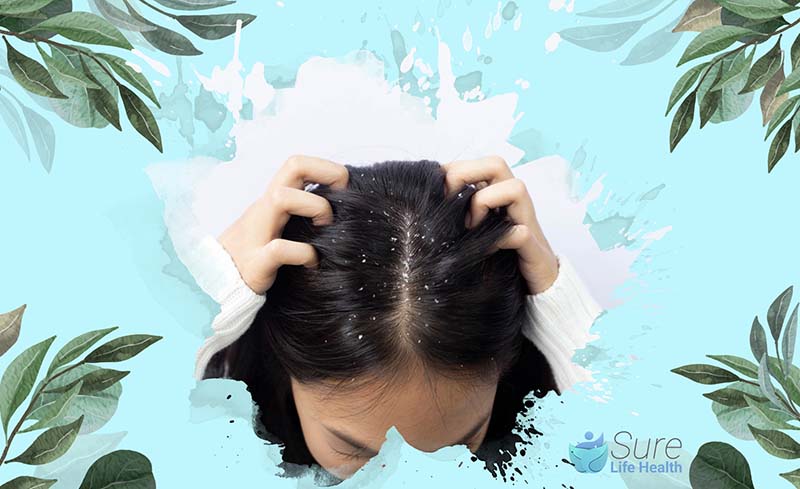
Adjusts Oil Production
Flaxseed plays a critical role in maintaining the scalp’s pH balance and regulating oil production.
By soothing and calming the scalp and sebaceous glands, flaxseed helps these glands produce just the right amount of oil, fostering robust and healthy hair development.
Reduces Hair Loss
Hair thinning can result from various factors, including too much sunlight, pollution, stress, and poor diet. Flaxseed is a nutritional powerhouse, abundant in fatty acids and vitamins that strengthen hair strands.
Integrating flaxseed into your hair care regimen can significantly reduce hair loss. This practice enhances the overall health and thickness of your hair.
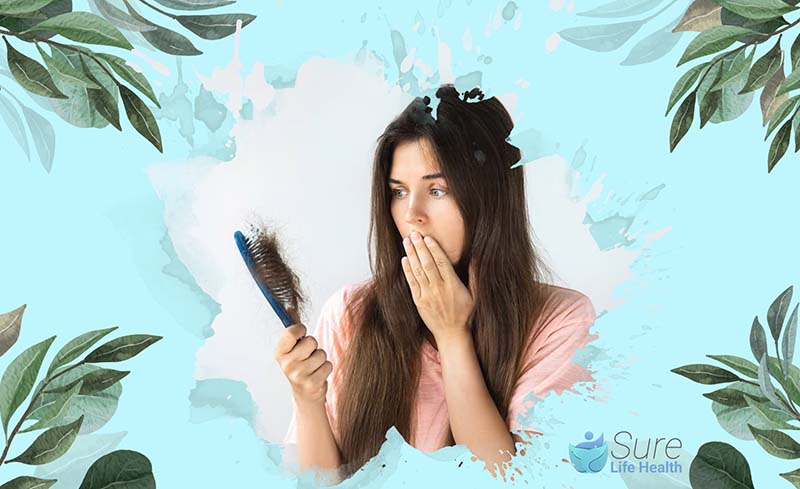
Using Flaxseed for Hair Growth
The benefits of flaxseed for hair growth may have left you in awe and wondering how to use it. Here’s how you can incorporate flaxseed into your hair care routine:
Flaxseed Oil
Start by warming two tablespoons of flaxseed oil. It should be warm enough and not too hot.
Apply the oil to your scalp with your fingertips, using circular motions to enhance absorption and hydration. Work the oil from the roots to the tips of your hair.
After application, wrap your hair in a hot towel to lock in the moisture and nutrients from the oil. Leave the oil in your hair for about 30 minutes before washing it off with a mild sulfate-free shampoo.
For best results, repeat this treatment two to three times a week.
Flaxseed Hair Mask
For a nourishing hair mask, grind a tablespoon of flaxseed into powder. Combine this with two tablespoons of yogurt and half a tablespoon of honey.
Mix these ingredients thoroughly and then apply the paste to your hair. Leave it on for about 30 minutes, then rinse it off using a gentle shampoo and conditioner. Use this mask once or twice a week for optimal hair health.
For a different variation, mix two tablespoons of olive oil with one tablespoon of flaxseed powder and one teaspoon of lime juice. Apply this mixture to your hair, ensuring to cover the tips. Leave it on for 30 minutes before washing off.
Flaxseed Hair Gel
To make flaxseed hair gel, boil ¼ cup of flaxseeds until the mixture thickens. Add a tablespoon of lime juice and stir until it forms a gel.
Remove from heat and leave it to cool down. Strain the gel and pour it into a container.
Use this gel before styling your hair to keep it neat, healthy, and shiny. This gel can be used daily to promote healthier hair growth.
Note: If DIY treatments are too time-consuming, consider opting for hair products that contain flaxseed.
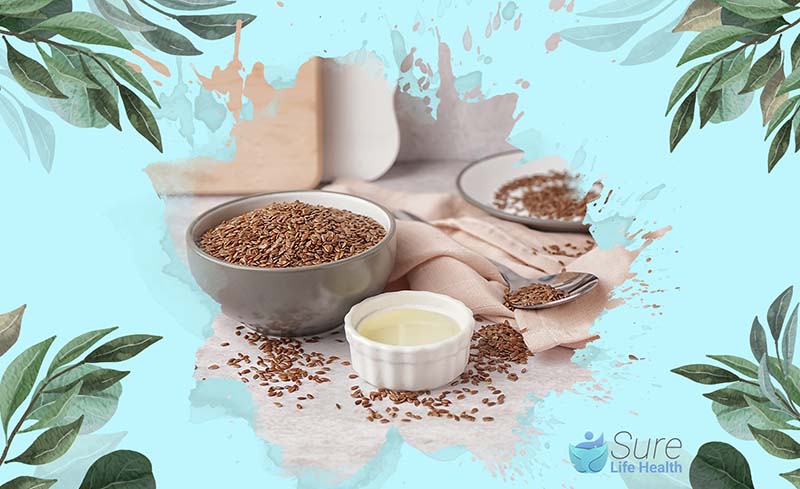
Potential Hazards Of Flaxseed Oil Application
The benefits of flaxseed for hair should not overshadow its potential risks. Here are some side effects to be aware of when using flaxseed:
- Gastrointestinal Issues: Flaxseed oil can cause abdominal discomfort including cramps, bloating, gas, diarrhea, and constipation.
- Toxicity Concerns: Consuming unground or unripe flaxseeds can be harmful for you.
- Blood Pressure Changes: There might be a decrease in blood pressure, which could be significant if you’re already on medication. Consult your doctor if there are any medical concerns.
- Cancer Risk: There is a debated potential for an increased risk of prostate cancer linked to flaxseed oil.
- Hormonal Effects: Flaxseed contains phytoestrogens, which may mimic estrogen and could affect a fetus during pregnancy.
- Drug Interactions: Flaxseed oil can interact with certain medications, including blood thinners, cholesterol-lowering drugs, and insulin used for diabetes.
- Skin Sensitivity: Topical application of flaxseed oil might cause sensitivity or allergic reactions in some individuals.
Conclusion
In summary, is flaxseed good for hair? Absolutely. Flaxseed addresses a variety of common hair concerns, including hair loss, dandruff, and split ends. Moreover, flaxseed enhances hair growth and shine.
How has your experience been with incorporating flaxseed into your hair care routine? Sure Life Health would love to hear about your results or any challenges you’ve faced. Share your experiences in the comments below, and let us know of any other problems you’re encountering so we can assist you more effectively.
Professor Gaye Cunnane, PhD, MB, FRCPI
As the Director of Health and Wellbeing at RCPI, Professor Gaye Cunnane is at the helm of initiatives aimed at enhancing the health and well-being of RCPI Trainers and Trainees. Her role extends beyond administration; she is also a respected clinical professor of rheumatology and a consultant rheumatologist at Trinity College Dublin (TCD) and St James’s Hospital. Prof. Cunnane’s medical journey began at TCD, where she graduated from medical school, and her path has been marked by both clinical and academic excellence.
After completing her basic clinical training in medicine, she embarked on PhD studies at University College Dublin and St Vincent’s University Hospital. Her research during this period was focused on prognostic markers in early inflammatory arthritis, a project that saw her collaborating with esteemed universities across Europe, including in Switzerland, The Netherlands, the UK, and Sweden.
Prof. Cunnane’s career took her to the University of California, San Francisco, where she spent three years delving into research on new treatments for lupus. Her academic prowess led her to the University of Leeds in 2001 as a senior lecturer, before returning to Ireland in 2003 to assume her current roles. She has also served as the National Specialty Director for Rheumatology training in Ireland, Programme Director for Basic Specialist Training with RCPI, and as a past President of the Irish Society for Rheumatology.
PUBLISHED ARTICLES
“Rheumatic disease differentiation using immunoglobulin G sugar printing by high-density electrophoresis”: Published in The Journal of Rheumatology, this study reflects her in-depth investigation into rheumatic diseases.
“Benefits of exercise in patients with rheumatoid arthritis: a randomized controlled trial”: This research work, highlighting the positive impact of exercise on rheumatoid arthritis, underscores Prof. Cunnane’s dedication to practical, patient-centered research.
Additionally, Prof. Cunnane has made notable contributions to the Annals of the Rheumatic Diseases, discussing early referral, diagnosis, and treatment of rheumatoid arthritis. She has also been involved in a study on the NCBI platform investigating exercise benefits in rheumatoid arthritis patients.
Professor Gaye Cunnane’s career is a testament to her commitment to improving patient outcomes in rheumatology through rigorous research, clinical excellence, and dedicated teaching. Her work continues to influence the field of rheumatology, both in Ireland and internationally.

